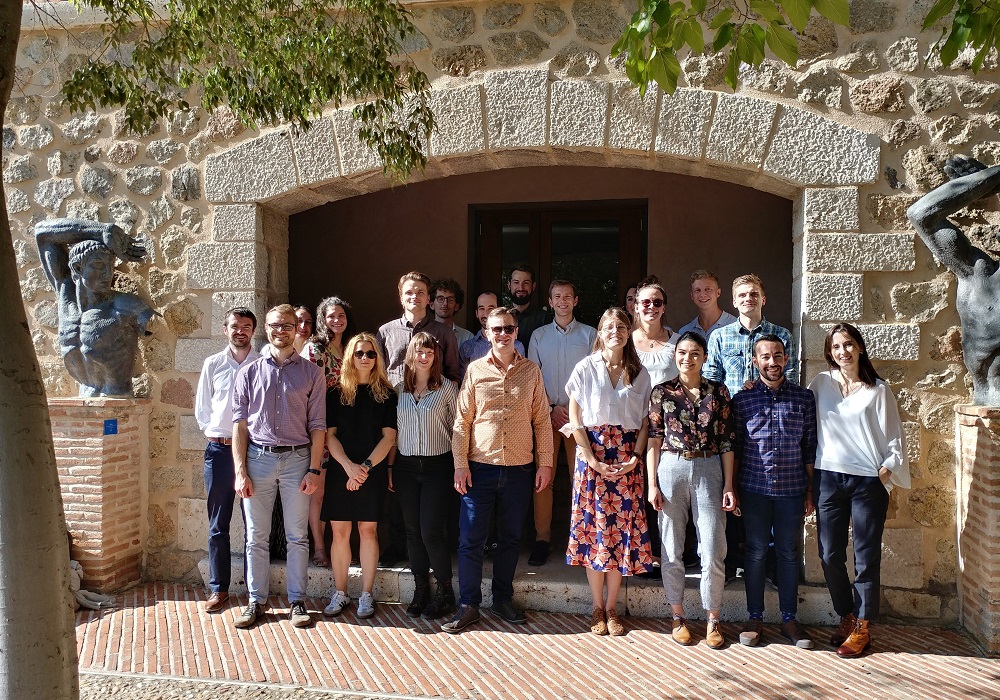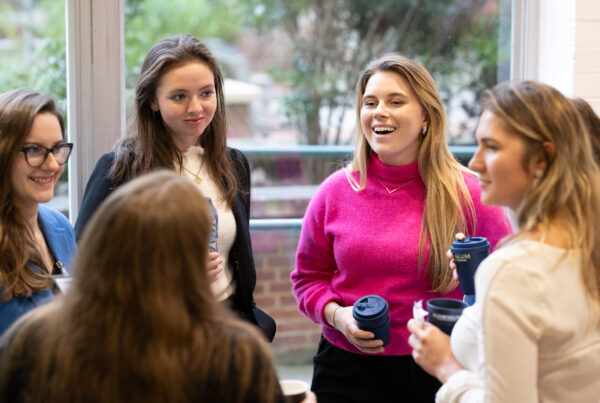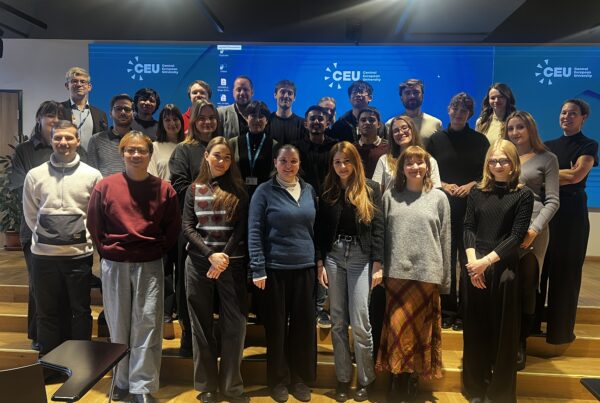
Europaeum Scholars Programme – policy briefs and recommendations 2021
The Europaeum conference ‘Crisis as an opportunity for Europe?’ in Toledo (Spain) 1-3 October 2021 marked the completion of the 2nd cohort of the Europaeum Scholars Programme, and the Scholars presented the fruits of their labour at this event. The 34 PhD students spent 18 months working in four groups on the below projects. Their findings were presented to a panel of judges:
Ben Hall, Europe Editor, Financial Times
Prof. Maria Joao Rodrigues, Director of the Foundation for European Progressive Studies (FEPS)
Anthony Teasdale, Director General of the European Parliamentary Research Services
Unmute the Youth was awarded the winning place with a small grant of £5,000 to spend on furthering the project.
This event was also special in other ways, as this group of Europaeum Scholars had only met online up to this point and it was great that 24 could attend in person.
InclusivEU – Advancing diversity in the European Commission’s workforce
Although it boasts a workforce of over 32,000 civil servants, the European Commission continues to suffer from a diversity gap when it comes to the representativeness of its workforce. While progress has been made in recent years to address the lack of representation of historically underrepresented groups by increasing the participation of women in middle and senior management roles and to improve access for people with disabilities, the inclusion of groups such as ethnic and racial minorities remains a challenge. Online campaigns such as #BrusselsSoWhite bought the issue to the forefront, emphasising that there has not been a single European Commissioner of colour to date. People of ethnic and/or racial minorities are also visibly underrepresented in the Commission workforce. President Ursula von der Leyen underscored the urgency of addressing the issue during her speech at the European Anti-Racism summit in March 2021, calling on the Commission to lead by example by bringing Europe’s diversity into the civil service.
The current lack of diversity is problematic for many reasons, ranging from the unfulfilled potential arising from the exclusion of valuable experiences and perspectives in the policy-making process to issues of justice and representativeness. Given the importance of EU institutions in creating and implementing public policy across the Member States, the institutions have a responsibility to strive for maximum representation and inclusivity. This project both highlights the challenges and obstacles that contribute to the Commission’s diversity gap and proposes concrete actions to address them.
Download policy brief (sharing licence CC-BY-NC-SA licence)
Download policy proposal (sharing licence CC-BY-NC-SA licence)
Ashlee Beazley, Eduardo García Cancela, Riccardo Nanni, Thalia Ostendorf, Elena Porter, Lewin Schmitt, Inga Steinberg, Sue Anne Teo, Mariana Vega Martinho
Lost in Transition? – Charting a course for Europe’s Automotive Industry workers
Our project crafts a policy response to the impact of rapid structural change on workers in Europe’s carbon-intensive industries, triggered by the green transition in Europe and the corresponding need to decarbonise domestic economic activity and associated value chains. This inevitable process has been accelerated by European Green Deal recovery policies adopted in response to the coronavirus crisis. Our project complements the renewed emphasis on European initiatives to promote a greener economy, with a focus on those most affected by the upheaval facing traditional automotive manufacturing. While the green transition enjoys substantial political support, it is also a source of great concern for groups of workers in vulnerable sub-sectors, and for their suppliers. Opposition to green policies has been seen among workers at risk of losing their jobs who also face difficulties in adapting to the new green economy. Failing to address these ‘just transition’ issues may pose a danger to the transition itself, with catastrophic consequences for the European public.
This project identifies opportunities for supporting those at risk of being left behind, and for bringing companies large and small, trade unions, and workers together. We choose to focus on the automotive industry, which is expected to accelerate its transition in the coming years. It is also structurally different to other industries subject to ‘just transition’ measures, notably coal, requiring a different set of policies that may also be transferable to other sectors. By giving companies a more active role in articulating their transition needs, and establishing new institutions modelled on similar attempts to address just transition issues elsewhere, this project proposes a possible model for other sectors to transition. It blends contemporary thinking on the just transition contributed by trade unions, with reflection on the social role of companies (across the value chain) in driving and guiding the transition, while taking into account the current economic and political context.
Download policy brief (sharing licence CC-BY-NC-SA licence)
Download policy proposal (sharing licence CC-BY-NC-SA licence)
Nils Renard, Chiara Lovotti, Peeter Vihma, Antonio Leitão Amaro, Frederik Forrai Ørskov, Joshua Hill, Kateřina Chadimová, Christoph Semken, Alex Clark
Making Room for Mental Health – The Bloom Box
European Society and the world of work seem destined for change. With a global health crisis coupled with the inevitability of green and digital transitions, thoughts turn to how societies will adjust, and continue to develop in the future. Yet, a question that has escaped the minds of EU and national policymakers alike is one of mental and social preparedness. A transitioning Europe must mean a prepared and anticipative Europe, a Europe which recognises the value of future-thinking approaches to crucial policy areas such as mental health and social welfare. As European societies respond to longer term challenges and the COVID-19 pandemic, unemployment, for young people in particular, has the potential to cause a lifetime of mental health problems. Before the pandemic, 1 in 6 Europeans suffered from poor mental health during their lives, costing Member States approximately 500 billion Euros, an estimated 4% of their GDPs. Mental health and unemployment are bidirectionally linked, in that mental health problems both increase the difficulty of finding and keeping a job and arise from unemployment. This project suggests innovative yet tenable solutions as to how both the EU and its Member States could and should react to the imminent mental health issues relating to youth unemployment including the ‘Bloom Box’: a toolbox to be sent to all youths when they register as unemployed and which is designed to help them manage the unemployment period. It helps youth reclaim their agency and ward off psychological distress around unemployment in a time of hardship.
Download policy brief (sharing licence CC-BY-NC-SA licence)
Download policy proposal (sharing licence CC-BY-NC-SA licence)
Tukkaa Brunila, Silke Creten, Ilana Hartikainen, Antonia Markiewitz, Arron McArdle, Ariadna Petri, Irene Soriano Flórez, Zea Szebeni
Unmute the Youth! A set of recommendations for policymakers regarding how to strengthen democracy by better engaging young people in e-democracy initiatives.
Democracy seems to be no longer in vogue. Not only are democratic values eroding but authoritarian ones are also increasing, especially among the young. Despite efforts by the European Commission and national governments to increase youth engagement, today young people are more disconnected from the democratic process than older generations. The Covid-19 pandemic appears as a critical juncture in the history of Europe after a period of crises. Therefore, we believe that now is the time to act to bring back the youth. Our objective is to bring young Europeans back into the fold by offering online democratic participation tools that they would be willing to use. This will, we hope, help unmute the youth!
Young Europeans aged 16 to 26 merit particular attention for several further reasons. They have been hit especially hard by the current pandemic in educational, employment and mental health terms. As their prospects have worsened, they still tend to ignore traditional political channels and prefer protesting populist parties to traditional ones. Given that the youngest are digitally active, online is where the bridges to the young need to be built. However, if we are to reach them through digital platforms these have to account for their distinctive characteristics such as their shorter attention filter and high expectations with regards to interfaces.
We hope our recommendations will help to foster a new ethos of political participation among the youth and thereby strengthen the underbelly of liberal democracy. They are based on 1) a review of the literature on the habits of the young, deliberative democracy and the existing participatory online platforms; 2) an exploratory survey across three European municipalities (Krakow, Leiden, Trieste) to identify the most salient reasons of disengagement; and 3) interviews with experts who have developed successful online tools of public deliberation and decision-making.
Download policy brief (sharing licence CC-BY-NC-SA licence)
Download policy proposal (sharing licence CC-BY-NC-SA licence)
Alessandro Ambrosino, Simon Cecchin Birk, Carlotta Mingardi, Georgios Nikolou, Lukas Spielberger, Elodie Thevenin, Alice Trinkle
More information on these and previous projects can be found here: https://europaeum.org/programmes/scholars-programme/group-projects/





